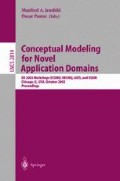Abstract
Business systems these days need to be agile to address the needs of a changing world. In particular the discipline of Enterprise Application Integration requires business process management to be highly reconfigurable with the ability to support dynamic workflows, inter-application integration and process reconfiguration. Basing EAI systems on model-resident or on a so-called description-driven approach enables aspects of flexibility, distribution, system evolution and integration to be addressed in a domain-independent manner. Such a system called CRISTAL is described in this paper with particular emphasis on its application to EAI problem domains. A practical example of the CRISTAL technology in the domain of manufacturing systems, called Agilium, is described to demonstrate the principles of model-driven system evolution and integration. The approach is compared to other model-driven development approaches such as the Model-Driven Architecture of the OMG and so-called Adaptive Object Models.
Access this chapter
Tax calculation will be finalised at checkout
Purchases are for personal use only
Preview
Unable to display preview. Download preview PDF.
References
Kovacs, Z.: The Integration of Product Data with Workflow Management Systems, PhD Thesis, University of West of England, Bristol, England (April 1999)
Estrella, F.: Objects, Patterns and Descriptions in Data Management, PhD Thesis, University of the West of England, Bristol, England (December 2000)
Mann, J.: Workflow and Enterprise Application Integration, analyst in Middleware (2001)
Estrella, F., et al.: Handling Evolving Data Through the Use of a Description Driven Systems Architecture. In: Kouloumdjian, J., Roddick, J., Chen, P.P., Embley, D.W., Liddle, S.W. (eds.) ER Workshops 1999. LNCS, vol. 1727, pp. 1–11. Springer, Heidelberg (1999)
Rao, B.R.: Making the Most of Middleware. Data Communications International 24(12), 89–96 (1995)
Joeris, G.: Toward Flexible and High-level Modeling and Enactment of Processes. University of Bremen (1999)
Sheth, A.P., van der Aalst, W.M.P.: Processes Driving the Networked Economy. University of Georgia, Athens (1999)
van der Aalst, W.M.P.: Making Work Flow: On the Application of Petri nets to Business Process Management. Eindhoven University of Technology, Edinhoven (2001)
Tari, Z., Pande, V.: Dynamic Workflow Management in CORBA Distributed Object Systems. RMIT University, IBMG GSA (2000)
Torchiano, M., Bruno, G.: Domain-Specific instance Models in UML. IDI NTNU (2002)
Joeris, G.: Decentralized and Flexible Workflow Based on Task Coordination Agents. University of Bremen (2000)
van der Aalst, W.M.P.: Generic Workflow Models: How to Handle Dynamic Change and Capture Management Information? Eindhoven University of Technology, Eindhoven (1999)
Klas, W., Schrefl, M.: Metaclasses and Their Application. LNCS, vol. 943. Springer, Heidelberg (1995)
The Unified Modelling Language (UML) Specification, http://www.omg.org/technology/uml/
Kiczales, G.: Object-Oriented Programming: The CLOS Perspective. In: Kiczales, G. (ed.) Metaobject Protocols: Why We Want Them and What Else Can They Do?, pp. 101–118. MIT Press, Cambridge (1993)
Gamma, E., Helm, R., Johnson, R., Vlissides, J.: Design Patterns: Elements of Reusable Object-Oriented Software. Addison-Wesley, Reading (1995)
Yoder, J., Balaguer, F., Johnson, R.: Architecture and Design of Adaptive Object-Models. In: Proc of OOPSLA 2001, Intriguing Technology Talk. Tampa, Florida (October 2001)
OMG Publications. Model Driven Architectures – The Architecture of Choice for a Changing World. See, http://www.omg.org/mda/index.htm
BPML: Business Process Modeling Language. BPEL4W: Business Process Execution Language for Web Services. See, http://www.bpmi.org/ , http://www.bpmi.org/
RM-ODP: A Reference Model for Open Distributed Processing, http://www.dstc.edu.au/Research/Projects/ODP/ref_model.html
Common Warehouse Metamodel & Meta-Object Facility. See, http://www.omg.org/technology/cwm/
Foote, B., Yoder, J.: Meta-data and Active Object-Models. In: Proc. of the Int. Conference on Pattern Languages Of Programs, Monticello, Illinois, USA (August 1998)
Author information
Authors and Affiliations
Editor information
Editors and Affiliations
Rights and permissions
Copyright information
© 2003 Springer-Verlag Berlin Heidelberg
About this paper
Cite this paper
Gaspard, S., Estrella, F., McClatchey, R., Dindeleux, R. (2003). Managing Evolving Business Workflows through the Capture of Descriptive Information. In: Jeusfeld, M.A., Pastor, Ó. (eds) Conceptual Modeling for Novel Application Domains. ER 2003. Lecture Notes in Computer Science, vol 2814. Springer, Berlin, Heidelberg. https://doi.org/10.1007/978-3-540-39597-3_2
Download citation
DOI: https://doi.org/10.1007/978-3-540-39597-3_2
Publisher Name: Springer, Berlin, Heidelberg
Print ISBN: 978-3-540-20257-8
Online ISBN: 978-3-540-39597-3
eBook Packages: Springer Book Archive

